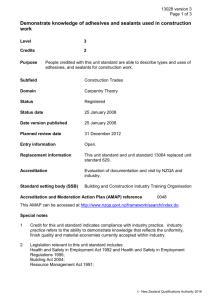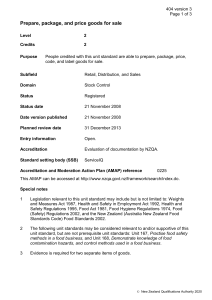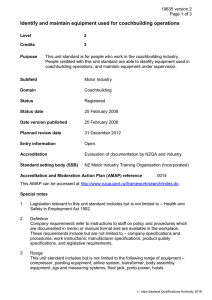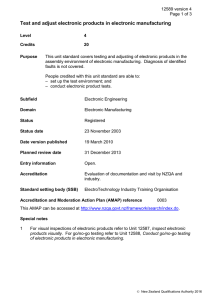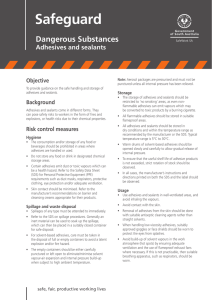15KB - NZQA
advertisement
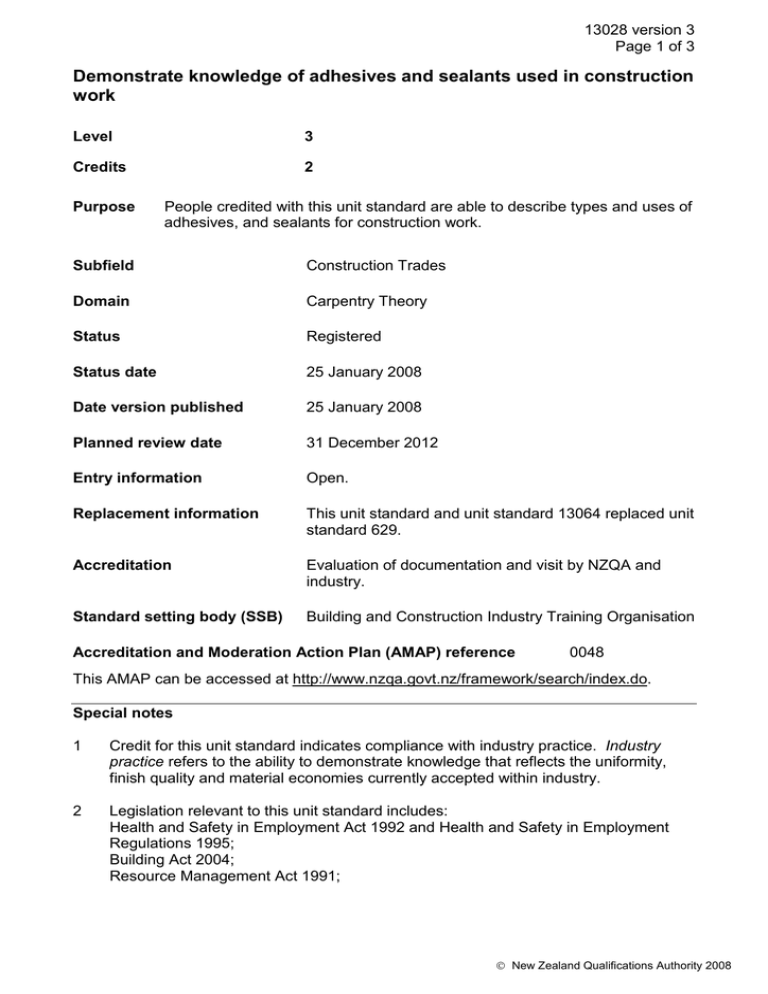
13028 version 3 Page 1 of 3 Demonstrate knowledge of adhesives and sealants used in construction work Level 3 Credits 2 Purpose People credited with this unit standard are able to describe types and uses of adhesives, and sealants for construction work. Subfield Construction Trades Domain Carpentry Theory Status Registered Status date 25 January 2008 Date version published 25 January 2008 Planned review date 31 December 2012 Entry information Open. Replacement information This unit standard and unit standard 13064 replaced unit standard 629. Accreditation Evaluation of documentation and visit by NZQA and industry. Standard setting body (SSB) Building and Construction Industry Training Organisation Accreditation and Moderation Action Plan (AMAP) reference 0048 This AMAP can be accessed at http://www.nzqa.govt.nz/framework/search/index.do. Special notes 1 Credit for this unit standard indicates compliance with industry practice. Industry practice refers to the ability to demonstrate knowledge that reflects the uniformity, finish quality and material economies currently accepted within industry. 2 Legislation relevant to this unit standard includes: Health and Safety in Employment Act 1992 and Health and Safety in Employment Regulations 1995; Building Act 2004; Resource Management Act 1991; © New Zealand Qualifications Authority 2008 13028 version 3 Page 2 of 3 Hazardous Substances and New Organisms Act 1996; New Zealand Building Code; NZS 3604:1999 Timber Framed Buildings, available from Standards NZ (http://www.standards.co.nz). Elements and performance criteria Element 1 Describe types and uses of adhesives for construction work. Performance criteria 1.1 Construction adhesives are described in terms of their types and uses in accordance with manufacturer’s instructions. Range 1.2 adhesives used for – timber, timber based products; plastics, glass, metals, plaster board, masonry, concrete, polystyrene, fibre cement. Hazards and controls are explained in accordance with manufacturer’s Material Safety Data Sheets or Environmental Resource Management Authority approval. Element 2 Describe types and uses of sealants for construction work. Performance criteria 2.1 Sealants are described in terms of their uses in accordance with manufacturer’s instructions. Range 2.2 sealants used for – timber, timber based products, plastics, glass, metals, plaster board, masonry, concrete, polystyrene, fibre cement, primers. Hazards and controls are explained in accordance with manufacturer’s Material Safety Data Sheets or Environmental Resource Management Authority approval. Please note Providers must be accredited by NZQA, or an inter-institutional body with delegated authority for quality assurance, before they can report credits from assessment against unit standards or deliver courses of study leading to that assessment. Industry Training Organisations must be accredited by NZQA before they can register credits from assessment against unit standards. Accredited providers and Industry Training Organisations assessing against unit standards must engage with the moderation system that applies to those standards. © New Zealand Qualifications Authority 2008 13028 version 3 Page 3 of 3 Accreditation requirements and an outline of the moderation system that applies to this standard are outlined in the Accreditation and Moderation Action Plan (AMAP). The AMAP also includes useful information about special requirements for organisations wishing to develop education and training programmes, such as minimum qualifications for tutors and assessors, and special resource requirements. Comments on this unit standard Please contact the Building and Construction Industry Training Organisation national.office@bcito.org.nz if you wish to suggest changes to the content of this unit standard. © New Zealand Qualifications Authority 2008
